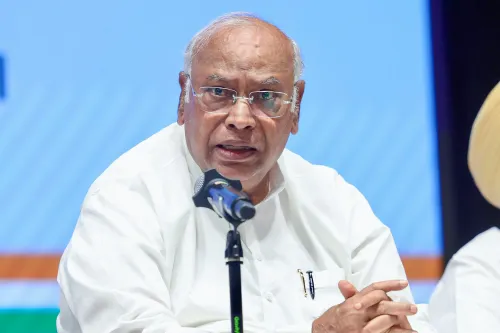How Are Saharsa Women Thriving with a PM Scheme?

Synopsis
Key Takeaways
- Women’s empowerment is crucial for rural development.
- The PMFME scheme significantly impacts small businesses.
- Traditional skills can lead to innovative business solutions.
- Collaboration across generations fosters stronger enterprises.
- Quality assurance in production is vital for market expansion.
Saharsa (Bihar), Aug 20 (NationPress) They say when optimistic thinking combines with diligent effort, success is bound to follow. In a remarkable story of creativity rooted in heritage, Basanti Kumari and her mother-in-law Lalita Devi, who reside in Ward 24, Patuaha within the Saharsa Municipal Corporation, have turned a simple household skill into a flourishing small enterprise—producing traditional “bari”.
What started as a family tradition has evolved into a comprehensive business, generating a monthly revenue of approximately Rs 1.5 lakh. Their achievement has been significantly enhanced by the Pradhan Mantri Formalisation of Micro Food Processing Enterprises (PMFME) scheme, through which they secured Rs 10 lakh in financial assistance to broaden their operations.
Basanti shared with IANS that her husband, Ratnesh Jaiswal, a food technologist employed with an NGO in Hyderabad, has also been instrumental in providing valuable guidance for their business. His technical knowledge, alongside Lalita Devi’s extensive experience in crafting traditional bari, has established a robust foundation for their venture.
Lalita Devi has been producing and selling homemade bari—made from urad dal, peas, and moong dal—for over four decades, from 1980 until 2023. However, it was in October 2024, with Basanti's involvement, that the business was formalized and diversified.
Currently, they produce 12 distinct varieties of bari, including: Masoor Bari, Urad Bari, Matar Bari, Chana Bari, Moong Bari, Mixed Dal Bari, Chana Garam Masala Mix Bari, Masoor Garam Masala Mix Bari, Urad Garam Masala Mix Bari, Beetroot Mix Bari, Ginger Mix Bari, and Carrot Mix Bari.
Their products now reach markets not only in Bihar but also extend to South India, making the duo proud exemplars of rural entrepreneurship.
Beyond being a simple family business, their enterprise is creating job opportunities for others as well. Basanti and Lalita have hired six local women who earn daily wages by assisting in the production process. On average, the unit processes around 50 kilograms of raw materials daily, resulting in a daily turnover of about Rs 5,000.
A significant advancement in their production method has been the creation of a sun-drying facility (“Suryakund”) in their backyard, constructed at a cost of Rs 5 lakh. This facility ensures hygienic drying conditions, free from dust, insects, and interference from animals or birds—adding a layer of quality assurance to their products.
The journey of Basanti Kumari and Lalita Devi is more than just a business success—it represents a paradigm of women’s empowerment, cross-generational collaboration, and self-sufficiency.
From a modest kitchen corner to establishing a brand, this mother-in-law and daughter-in-law duo is demonstrating that traditional knowledge, combined with modern thinking and governmental support, can create sustainable livelihoods. Their initiative is now recognized as an inspiring model for rural women aspiring to achieve financial independence and self-employment.









